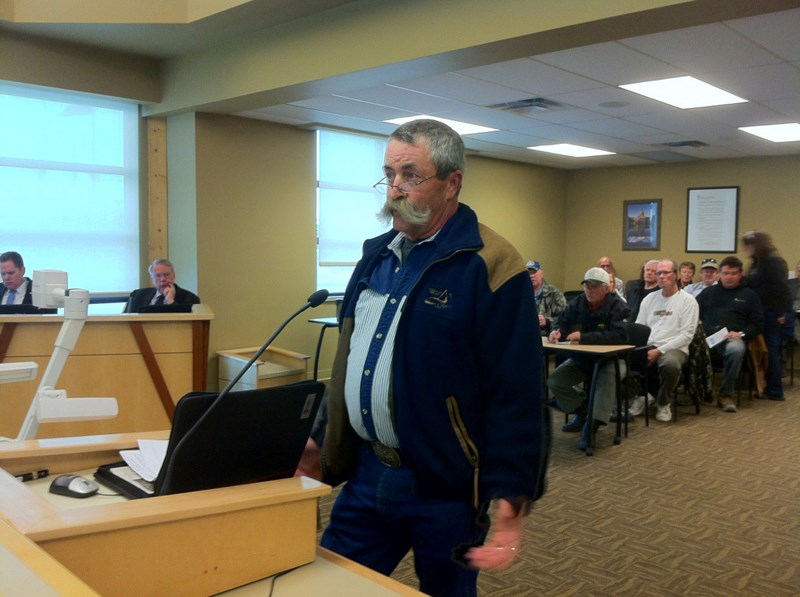A public hearing has started into proposed amendments to the Mountain View County land use bylaw that would add a new land use district titled “aggregate extraction/processing district.”
MVC councillors had earlier instructed administration to explore the feasibility of creating a new land use district to accommodate gravel pit and mining operations.
The public hearing into the proposed amending bylaw got underway on April 10 at county council chambers.
Under the current Bylaw No. 11/11, gravel pit and mining operations are considered discretionary uses in agriculture, heavy industry and airport districts under the definition of “natural resource extraction/processing” and are not subject to public hearing.
The amended bylaw would delete the “natural resource extraction/processing” definition and replace it with “aggregate extraction/processing” and “mineral resource extraction/processing.”
“By splitting up the current definition into two, the variety of uses under the current definition would then be better addressed and a new district to accommodate mining and extraction could then be created,” said director of planning John Rusling.
“One significant benefit of having a separate district for aggregate extraction would be the opportunity for the public and council to participate in the redesignation process through the public hearing process.”
The aggregate extraction/processing district would accommodate the use for anything that is “mined”, which includes sands, gravel, peat, clay, shale and stone.
The mineral and resource extraction/processing would not be a new district but rather a new use for consideration under the agriculture, heavy industry and airport districts in the land use bylaw.
All proposed gravel pits and other uses defined under aggregate extraction/processing would be required to be appropriately redesigned prior to any development permit applications being accepted.
“Redesignations are a public process and, as per the municipal government act, require circulation to the adjacent landowners, advertisement, and a public hearing prior to being considered by council,” he said.
“This gives an opportunity to all who may be affected to voice their concerns in front of council. Gravel pit or extraction operations would not be permitted in any other district.”
Existing gravel pits would not be required to designate until such time as their permit expires, is modified, amended or expanded.
“They can work status quo until the pit size expands or changes in any way. Any pit operations working without the appropriate permits in place will require redesignation and will not be grandfathered. New county pits will also require appropriate redesignation through the public hearing process,” he said.
As well, redesignation would not be required on borrow pits, as these are temporary, one-time use that is for a very specific county or provincial projects that do not involve the use of typical gravel pit equipment such as crushers and conveyors.
During the April 10 public hearing, McDougal Flats resident Murray Griffin said, “We all need gravel, there's no doubt about that. I'm not against industry, but there is dry aggregate and we don't have to go into aquifers. So I would say, there has to be buffer zones when you are in residential zones and there are hundreds of people that are affected.
“We are saturated with truck traffic already. Sundre has a one-lane bridge. How much traffic can it support? I don't know how much traffic the county expects the road can handle. As a taxpayer in this county I want to make sure we have some say.”
Darcy Dobush, who told council he is in the gravel business, said: “We all know there is a lot of work involved to get all the permits in place. I feel that the development permit handles it. Every pit is looked at.”
Water Valley gravel pit owner Rick Hoogenboom told the hearing: “In 2008 I spent $200,000 to get my permit on the Water Valley pit because of the stuff you guys (county) made me go through. We contacted the neighbours. We had meetings.
“Now you are adding all these new things. It is just going to escalate the costs to the point where, is it worth it? With the pits that have already been approved, are we going to have to go through those costs again?”
Councillors passed a motion to defer the continuation of the public hearing into the proposed bylaw amendment to August 14.
Councillors did not vote on second reading on the amending bylaw.
Following the meeting, Reeve Bruce Beattie said council is determined to find a balance between the interests of industry and residents.
“We have residents who are very concerned about gravel pits and we have operators who want to be operators so we are trying to find a strategy that meets both of those needs,” said Beattie. “It's not an easy road to go down. How do we balance those two very diverse opinions?
“We are looking at a very open process, with no hidden agendas, to cover this issue. We left the public hearing open so we can go through a process over the next few months of looking at what our strategy should be in developing that resource. Clearly we need a strategy in the county.”
He said he believes the bylaw amendment “is one of the components of the answer.”



